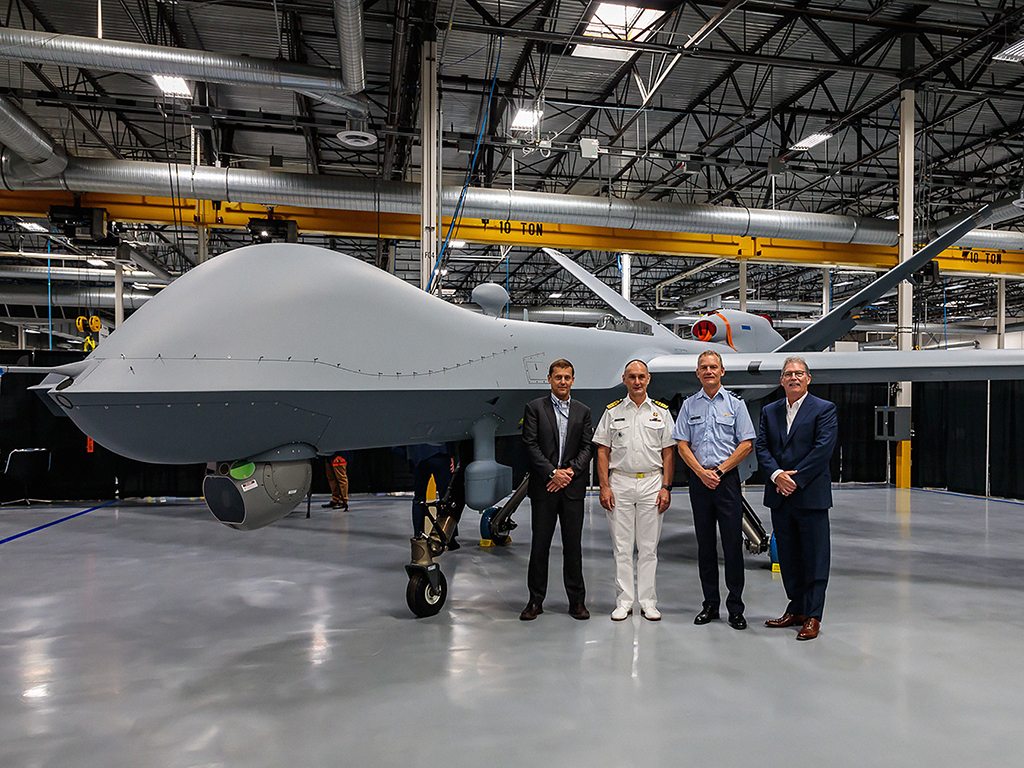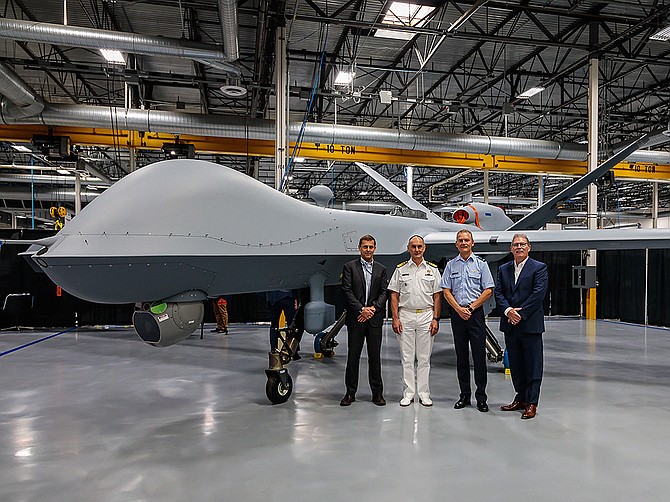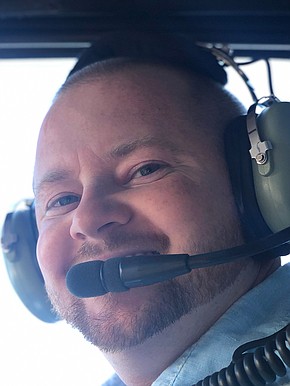Photo courtesy of General Atomics Aeronautical Systems Inc.
General Atomics Aeronautical Systems Inc. hosted a roll-out event for the Royal Netherlands Air Force in early July, marking the completion of the country’s first MQ-9A Block 5 remotely piloted aircraft. Seen on the factory floor are GA-ASI CEO Linden Blue (left) Vice Adm. Arie Jan De Waard, Lt. Gen. Dennis Luyt and GA-ASI President David R. Alexander.
The business said it completed its first remotely piloted MQ-9A Block 5 aircraft for the Netherlands, as well as the first ground station. It marked the occasion by hosting leaders from that country’s military at its factory in Poway.
Separately, GA-ASI announced on July 22 that the United Kingdom’s Ministry of Defence (MoD) exercised an option to buy 13 remotely piloted aircraft called Protector RG Mk1. Financial terms of the deal were not disclosed.
The recent order augments the U.K.’s first order of three Protector aircraft, bringing the total to 16.
The contract for the first three aircraft was announced one year ago. In September, GA-ASI announced the completion of the first Protector-configured MQ-9B, which is now supporting system testing as part of a combined U.K. MoD, U.S. Air Force and GA-ASI test team. Known as UK1, the first Protector will be delivered to the U.K. client later this year. It will remain in the United States to complete the Royal Air Force’s test and evaluation program before moving to its U.K. home base in 2022.
The aircraft for the Netherlands will begin its acceptance testing early next year at GA-ASI’s Gray Butte Flight Operations Facility near Palmdale. It will be delivered to the Netherlands soon after.
Repair Deal Worth $13M to Northrop Grumman
The U.S. Air Force awarded Northrop Grumman Corp. a $13 million modification to a contract for repair services for the RQ-4 Global Hawk and MQ-4C Triton unmanned aircraft, which are similar.
Cubic to Build Radios for Air Force
Cubic Corp. announced on July 26 that its Cubic Mission and Performance Solutions division was awarded the Small Form Factor (SFF) Radio Phase 2 task order worth more than $10 million under the U.S. Air Force Data Links Enterprise indefinite delivery, indefinite quantity contract.
Cubic will develop two prototype variants, a SFF Software Definable Radio (SDR) for troops on foot (“dismounted warfighters” in military parlance) and a generic Open Mission Systems/Open Communication Subsystem 3U VPX Air Data Terminal enabling the exchange of multiple information types and formats including full motion video.
“Cubic’s innovative and high-performance offering features a novel protected waveform that uniquely meets the Air Force’s needs for conducting air to ground communications without risking warfighter safety,” said Mike Knowles, president of Cubic Mission and Performance Solutions. “We are thrilled to have been selected to support Small Form Factor Radio, Phase 2. This opportunity expands on the successful work we have accomplished in previous developmental efforts for the Air Force.”
Space Micro Gets Communications Work
Space Micro, based in Carmel Mountain Ranch, announced on July 27 that it received a contract from the U.S. Air Force to develop a space-qualified, highly capable digital system to convert radio frequency (RF) to optical signals as well as optical to RF signals. This advanced technology will allow seamless reception and transmission of radio signals across optical links. The innovative Full Duplex RF-to-Optical Converter (FD-ROC) readily interfaces with heritage radio frequency systems.
Moving RF signals over Free Space Optical (FSO) links provides many advantages to operational forces. Laser communications links are immune to electromagnetic interference, radio frequency interference and electromagnetic pulses. They are extremely difficult to intercept and allow for greater link distances than RF communication systems. FSO links are ideal for crosslinks between space vehicles, as well as high data rate backhaul links to earth.
Citadel Receives Contracts Worth $4 Million
Citadel Defense said that it recently received $4 million in new government contracts for its Titan counter-drone solution. The undisclosed government customer selected Citadel’s Titan as the preferred radio frequency sensor for both standalone and highly integrated layered defense solutions. The Titan systems will be utilized for pre-deployment training, mobile security and fixed site protection.
Rapid proliferation of small, low-cost drones threatens personnel and critical assets, impacting the military’s ability to conduct successful operations. Unmanned systems have been used by terrorists to collect intelligence, bypass ground-based physical barriers and carry out highly effective attacks.
“Citadel’s advanced algorithms, artificial intelligence and autonomous capabilities serve as a force multiplier when protecting against unmanned system threats in resource-constrained environments,” said Christopher Williams, CEO of Citadel Defense.
Citadel announced the June contract wins on July 15.




